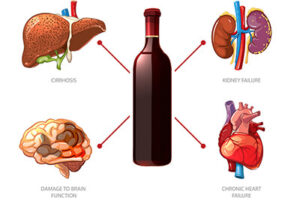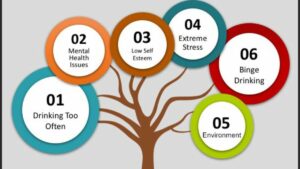Contents
- 1 What Is Alcoholism?
- 2 Signs Of Alcoholism
- 3 Effect Of Alcoholism on body
- 4 Effects of Alcoholism On those Around You
- 5 Risk Factors For Alcoholism
- 6 How To Get Help For Alcoholism?
- 7 Alcoholism Prevention
- 8 Helping a Family Member With Alcoholism
- 9 Treatment Options For Alcoholism
- 10 Alcoholism and Alcohol Abuse
- 11 Alcohol Poisoning
What Is Alcoholism?
 Alcoholism is a disease of the brain and body that is characterized by tolerance, withdrawal, and loss of control. Alcoholism can be considered a form of chemical dependence and addiction caused by the frequent consumption of alcohol. Long-term heavy drinking, which includes binge drinking, causes changes in the brain that make it hard for someone to stop or limit their intake of alcohol even if they want to.
Alcoholism is a disease of the brain and body that is characterized by tolerance, withdrawal, and loss of control. Alcoholism can be considered a form of chemical dependence and addiction caused by the frequent consumption of alcohol. Long-term heavy drinking, which includes binge drinking, causes changes in the brain that make it hard for someone to stop or limit their intake of alcohol even if they want to.
Alcoholism is a chronic disorder that affects both the brain and body. Alcoholism is characterized by tolerance, withdrawal, and loss of control over one’s drinking. The disease can be considered a type of chemical dependence or addiction caused by heavy alcohol consumption. Someone with alcoholism may crave alcohol even if they want to stop drinking. Alcoholism may lead to medical problems such as high blood pressure, liver disease, and cancer. Treatment programs are available for those who need them; all you have to do is take that first step towards seeking help.
Signs Of Alcoholism
One sign someone might have a problem with alcoholism is if they go on long binges after not drinking for a while. Another sign is if they drink every day or several times each week, no matter what. People who are struggling with alcoholism may also neglect their responsibilities at home, school, or work to the point that it becomes an issue.
The signs are-

- Going on an extended binge after not drinking for a long time
- Drinking every day or several times each week, no matter what the situation is
- Neglecting responsibilities at home, school, or work to the point that it becomes an issue
- Experiencing strong cravings for alcohol
- Having withdrawal symptoms such as nausea, sweating, and anxiety when not drinking
- Feeling like you can’t control how much alcohol you drink
- Continuing to drink even if it causes problems with relationships, work, or school
- Lying about how much alcohol is consumed or hiding alcohol in odd places
- Developing a tolerance, or having to drink larger amounts of alcohol for the desired effect
- Continuing to drink even if it causes negative effects on your mental and physical health
Effect Of Alcoholism on body
 When someone has alcoholism, their body and brain are both affected. The disease can cause serious medical problems such as high blood pressure, liver disease, and cancer. Alcoholism may also lead to mental health conditions such as depression or anxiety. Treatment programs are available for those who need them; all you have to do is take that first step towards seeking help.
When someone has alcoholism, their body and brain are both affected. The disease can cause serious medical problems such as high blood pressure, liver disease, and cancer. Alcoholism may also lead to mental health conditions such as depression or anxiety. Treatment programs are available for those who need them; all you have to do is take that first step towards seeking help.
The physical and mental effects of alcoholism remain even after an alcoholic is no longer drinking. These effects can include poor sleep patterns, malnutrition, depression, and problems with concentration and memory. Long-term alcoholics may experience delirium tremens (“DTs”), a dangerous withdrawal symptom characterized by confusion and hallucinations if they stop drinking abruptly. In the most serious cases, alcoholics can die from the withdrawal process.
If you or someone you know is struggling with alcoholism, don’t hesitate to get help. Treatment programs are available and can be tailored to fit each individual’s needs. With the right support, recovery is possible for anyone dealing with this disease.
Effects of Alcoholism On those Around You
Alcoholism can also affect those around the alcoholic because of the negative consequences associated with it. It is important for loved ones to know when their loved one has an addiction to alcohol and be supportive in their efforts to get help. Interventions such as counseling, addiction treatment programs, and support groups can all help in cases of alcoholism.
Alcoholics and alcohol abusers are considerably more likely to divorce, have domestic violence problems, be unemployed, and live in poverty. Children of alcoholics are also more likely to become alcoholics and can experience a range of emotional and behavioral problems. It is important for loved ones to get help for the alcoholic in their lives, as well as for themselves.
Alcoholism is a serious disease that can have serious consequences for both the individual and those around them. If you or someone you know is struggling with alcoholism, don’t hesitate to get help. Treatment programs are available and can be tailored to fit each individual’s needs. With the right support, recovery is possible for anyone dealing with this disease.
There are many different ways to treat alcoholism, and no one program is right for everyone. Some people may need inpatient treatment, while others may only need outpatient care.
Risk Factors For Alcoholism

Risk factors for alcoholism include-
- A family history of alcohol problems
- A history of trauma
- Early exposure to substances
- Stress
- Environment
It could also be due to a lack of coping skills and the person might not know how to deal with life’s problems or situations. They turn to alcohol as an escape from their reality.
If you think you might have a problem with alcoholism, don’t wait! Talk to somebody today about your concerns and get on the path towards recovery. Treatment programs exist for those who need them; all you need to do is take that first step and say that you need help.
How To Get Help For Alcoholism?
If someone needs help for alcoholism, there are programs available tailored to their individual needs. Twelve-step programs such as Alcoholics Anonymous provide support and help addicts achieve and maintain sobriety. Psychiatric medications exist that can be used to treat associated mental conditions such as depression or anxiety. Treatment programs may take place in a hospital setting for those struggling with withdrawal symptoms, detoxification, and supervised care.
Twelve-step programs– these are 12-step programs such as Alcoholics Anonymous that offer support and help addicts achieve and maintain sobriety.
Psychiatric medications– these are medications prescribed by a psychiatrist to treat mental conditions such as depression or anxiety.
Hospital setting– this is where someone goes to receive treatment for alcoholism in a hospital setting. This may include detoxification and supervised care.
Alcoholism Prevention

To prevent addiction from developing in the first place, it is important to be aware of the risks associated with alcohol consumption. Don’t drink to get drunk; drink only what is considered a moderate amount. Avoid binge drinking, which is defined as four or more drinks in one sitting for women and five or more drinks for men. Drink slowly and allow yourself time to eat and drink water between alcoholic beverages. Be aware of the signs of addiction, and don’t be afraid to seek help if you think you need it.
Some tips to help prevent addiction from developing in the first place include-
- steering clear of situations where alcohol will be abundant, such as at parties or bars.
- Alcohol needs to be consumed with a meal so that it’s easier for your body to metabolize.
- Drinking lots of water and other fluids will help keep you hydrated and reduce the likelihood of developing a hangover.
- Avoid drinking games or consuming shots, as these increase your chances of becoming addicted.
- If you do choose to drink, do so in moderation. One drink per day for women and two drinks per day for men is the recommended limit.
Helping a Family Member With Alcoholism
Helping a loved one who is struggling with alcoholism can be difficult, but it is possible. Here are a few things you can do to help:
1. Show your support. Let your loved ones know that you are there for them and that you will stand by them through their recovery.
2. Get involved in their treatment. Attend counseling sessions or support group meetings with them, and offer to help with transportation or childcare if needed.
3. Educate yourself about alcoholism and its effects. Knowledge is power, and the more you know about the disease, the better equipped you will be to help your loved one.
4. Don’t enable the addiction. It can be difficult to stand up to an alcoholic, but it is important to take a stand if you want them to get sober. Enabling means doing things for an alcoholic that they should be doing themselves. This could include making excuses for their drinking or behavior, covering up for them when they are drunk or hungover, or bailing them out of jail.
5. Don’t be afraid to seek help for yourself. You might feel like you have to deal with the problem all by yourself because you want to be strong for your loved one, but this is a serious issue and if you get support from others it could make a world of difference in both your lives.
Treatment Options For Alcoholism

There are many different types of treatment available for those who need it. Some people may need inpatient treatment, while others may only need outpatient care. Treatment options include residential treatment, detoxification, and counseling.
Residential treatment is a type of inpatient treatment where the individual lives at the facility while they receive treatment.
Detoxification is a process that helps an individual rid their body of alcohol so that they can then begin to receive treatment for their addiction.
Counseling is a type of outpatient treatment that helps individuals deal with the issues that led them to abuse alcohol in the first place.
No one program is right for everyone, and it is important to find the right type of treatment for each individual. With the right support, recovery from alcoholism is possible for anyone.
If you are looking for information about addiction or you need to talk to someone about a loved one who is struggling with addiction, please call us. Our counselors are available 24 hours a day, 7 days a week, and they can help you find the resources you need.
Alcoholism and Alcohol Abuse
Alcoholism and alcohol abuse can have serious consequences for both the individual and for those around them. It is a disease that affects the brain, and when someone has it, they are unable to control their drinking. Alcohol abuse is defined as drinking more than is considered healthy or safe.
Some of the consequences of alcoholism and alcohol abuse include health problems such as liver disease, high blood pressure, and cancer. Alcoholism can also lead to mental health conditions such as depression and anxiety. Treatment programs are available for those who need them, and with the right support, recovery is possible.
Alcohol Poisoning

When a person drinks too much alcohol, they can become severely ill or even die. This is called alcohol poisoning. Alcohol-affected individuals have a difficult time knowing when they have had too much to drink. It’s important for people who are going to be drinking alcohol to pace themselves and have non-alcohol beverages between alcoholic beverages.
This page is part of our larger drug information educational effort. Please bookmark the page so you can come back to it at any time.
Effects of Alcohol Poisoning
The effects of alcohol poisoning vary because each individual has different tolerances for alcohol. Some common symptoms of this condition include confusion, slurred speech, uncontrollable actions, vomiting, staggering, slow breathing, or no breathing at all among others.
When an individual experiences alcohol poisoning, it is a medical emergency and they need to get to the hospital immediately. Treatment for alcohol poisoning generally includes intravenous fluids and oxygen, as well as other treatments depending on the individual’s symptoms.
It is important for people who are going to be drinking alcohol to pace themselves and have non-alcohol beverages between alcoholic beverages. Some examples of this include water, juice, and soda. By staying hydrated and limiting the number of alcoholic drinks, you can cut out a lot of risk for alcohol poisoning and other negative side effects associated with drinking too much alcohol.
For more information, please contact MantraCare. Addiction is a chronic and often relapsing disorder characterized by compulsive drug-seeking and use despite harmful consequences. If you have any queries regarding Online Addiction Counseling experienced therapists at MantraCare can help: Book a trial Online therapy session


